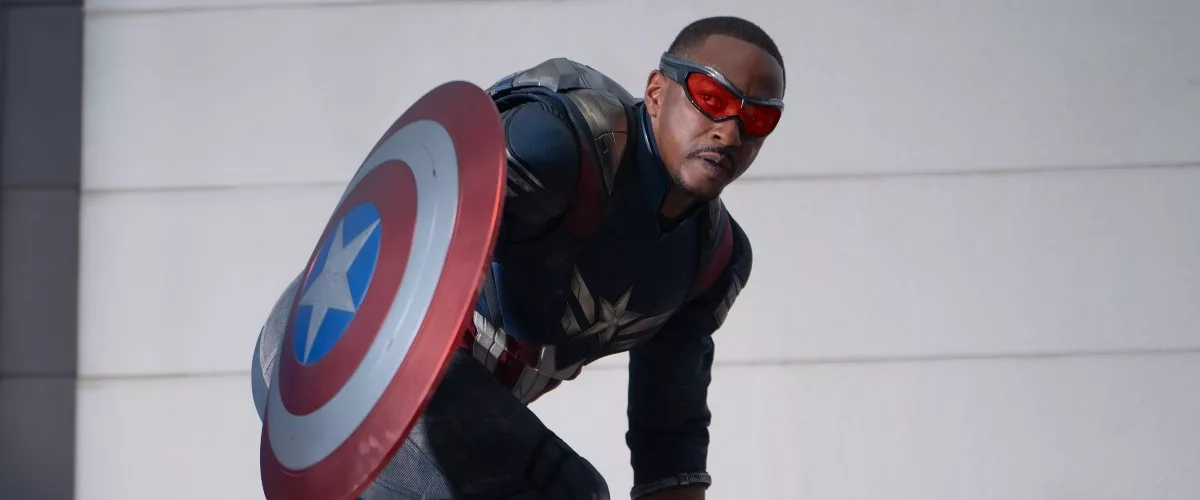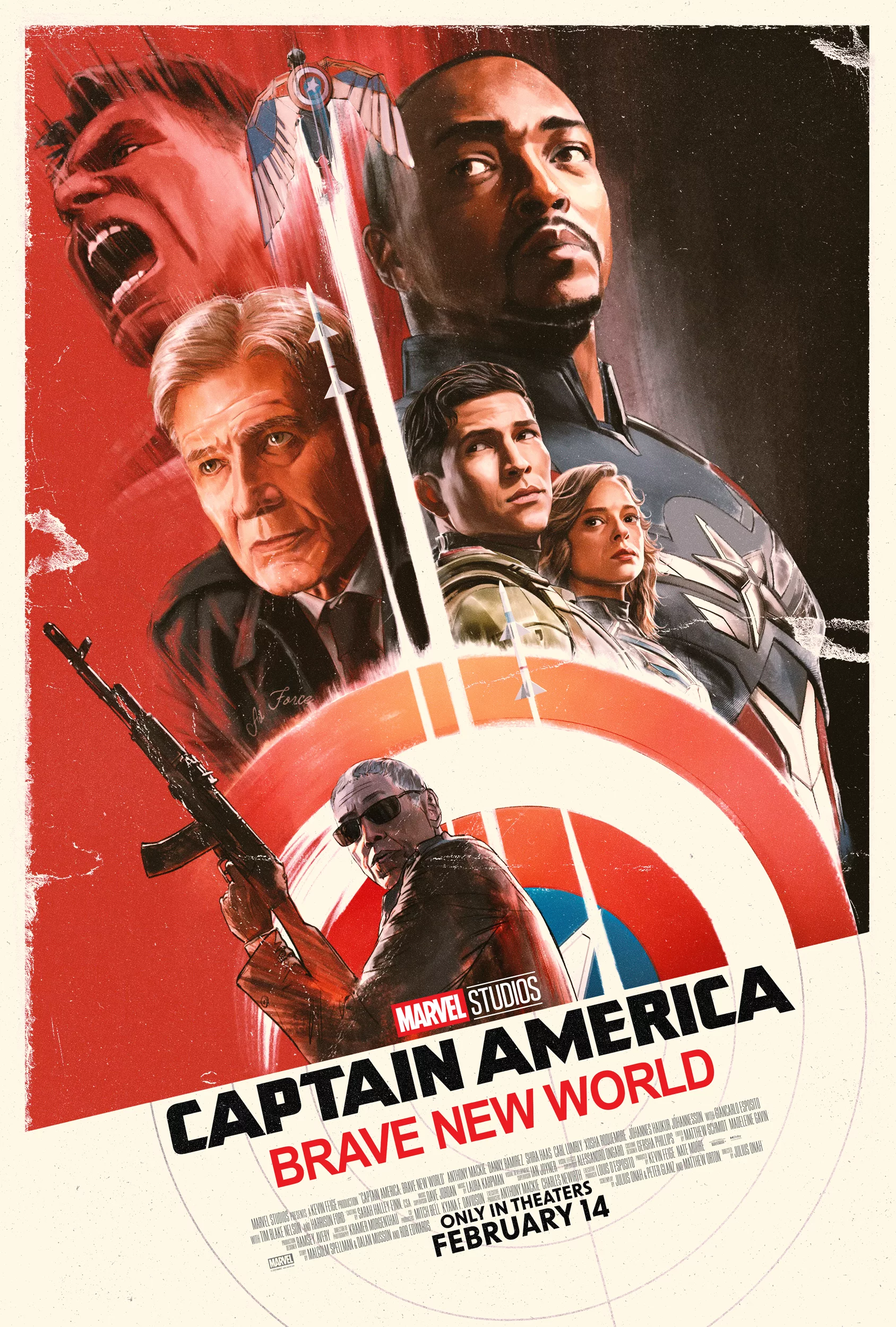Like its prequel television series, “The Falcon and the Winter Soldier,” the newest MCU film, “Captain America: Brave New World,” hopes to explain why a Black man would want to represent a country that has so rarely protected people who look like him. From the beginning, Sam Wilson (Anthony Mackie), now Captain America, trusts the sanctity of the US government. But why does Wilson want to be part of the system? Why does he grin and bear it in the face of people who so clearly despise him? Is representation alone really the balm for a broken country? To fully approach these questions, the MCU would need to be something it’s not: radical. Instead, this film series wants normalcy, to be everything for everybody. That misbegotten desire brings down Wilson and makes this latest installment in cinema’s longest-running soap opera its most out of touch yet.
“Captain America: Brave New World” was never going to be a revolutionary text. But considering “The Falcon and the Winter Soldier” at least made allusions to the Tuskegee experiments, the exploitation of Black bodies, and the prison industrial complex, there was some optimism this film would tie those threads together for a vibrant contemporary fabric. Instead, “Brave New World” clumsily wraps distant political themes around misshapen action set pieces for a film whose want to entertain overpowers any narrative coherence. These heroes stand for nothing, and as such crumble before our eyes as they try to safeguard a milquetoast future born out of a buried fascist past. “Brave New World” is the relic of a post-racial dream, built with respectability tools that have been not only ineffectual but self-destructive.
Many will say they don’t come to the MCU for politics, but director Julius Onah’s film doesn’t merely invite such conversation, it purposely prompts it. “Brave New World” begins with newly elected president Thaddeus Ross (Harrison Ford) inviting Wilson for a White House reception. Not only does Wilson appear, but he also brings his sidekick, Joaquin Torres (Danny Ramirez), aka the new Falcon, with him. He even talks the ‘forgotten Captain’ Isaiah Bradley (Carl Lumbly), who’s still angry at America’s decades-long experimentation on him, into coming with them. Ross has two goals for the night: He wants Wilson to remake the Avengers, and he is aiming to broker a multinational treaty with Japan built on the discovery of adamantium on Celestial Island (you know, the part of the world where a godlike alien’s body has remained half-hatched since “Eternals” but never commented upon). The celebratory night, however, takes a turn when the dulcet chimes of The Fleetwoods’ “Mr. Blue” causes a mind-controlled Bradley to go full Manchurian Candidate by attempting to assassinate Ross. With Bradley now imprisoned, Wilson works to clear his friend’s name before the system psychologically and physically kills him.
You’d think the wrongful imprisonment of Bradley would spark some internal conflict within Wilson about his continual support of an anti-Black system. But it’s quite the opposite. He works to uphold the government by arguing in favor of a supposed implicit good within Ross, whose estrangement from his daughter Betty (Liv Tyler) following his hunting of the Hulk inspires the authoritarian politician to reach for peace. Ross and Wilson’s shared hope for harmony is interrupted by Samuel Sterns (Tim Blake Nelson, reprising his “The Incredible Hulk” role), a scientist with an axe to grind against Ross. Sterns isn’t much of a villain. You could pretty much replace him with a fern, and it wouldn’t drastically change much; he lacks viciousness, depth, and a personality. His nonplussed presence, given little added weight by the prickly score, causes an already inert film to drag. Seriously, no MCU movie has felt as long as “Brave New World.” Half the story is Wilson and Torres, with the aid of Ross’ chief of security, an Israeli former Black Widow named Ruth Bat-Seraph (Shira Haas), going through the motions of an investigation that quickly loses steam and offers few laughs.
The only saving grace of Onah’s film is the intermittently sturdy, well-crafted action. Onah actually likes seeing limber, muscular bodies moving through space, appreciating the palpability of the human form. An opening fight in Mexico between Serpent leader Sidewinder (Giancarlo Esposito) and Wilson, for instance, flourishes through a bevy of full shots that allow viewers to feel each bruising punch. Unlike the flat photography of previous Marvel films, in this opening sequence, Onah and his DP Kramer Morgenthau at least allow for evocative shadows to carve their actors’ faces—a game Esposito is a major beneficiary of this aesthetic approach. He’s the one person in this film who holds the necessary spark to light up the screen. Unfortunately for Esposito, the filmmaker abandons that visual language during another one of the actor’s scenes, a brawl in a junkyard. The sludgy, colorless photography returns with a vengeance here, doing neither Esposito nor Mackie any favors.
The final half hour of “Brave New World” is equally tedious, zeroing in on the personal pains and latent rage within Ross. Ford tries to conjure some magic (he is still capable of uniquely granting dark villainous figures an edge of humanity) but is mostly saddled with clichéd dialogue. Considering Ford’s all-American screen persona, you’d think Onah would mine his star’s past (“Patriot Games” or even “Air Force One“) to swerve audience expectations. Instead, Ford’s inclusion becomes an unforgivable missed opportunity. The only burst of excitement they grant him comes when he transforms into Red Hulk (the VFX here are actually pretty stellar). His fiery, all-out rampage—which Wilson wrestles to stop—is chock full of symbolism representing a burning country, a fractured White House, and a government anguished by its role as the “world police.” The metaphors here aren’t loud; they’re screaming, making “Brave New World” less a chance at escapist entertainment and one preoccupied with its own sense of self-importance.
The entire franchise’s inability to balance substance with pleasure crashes into its inept conclusion. In fact, I’m not sure I’ve hated an ending to a movie more in recent memory than this one. For the purposes of this review, I will not spoil it. But let’s just say this film imagines it’s living in a different country, nay a different world, than the reality many have experienced. It argues for unearned forgiveness while making rushed, last-second nods to the weight of Black excellence, the fight to gain a seat at the table, and the importance of representation. It not only turns its hero into a Magical Negro. In an effort to soothe white America’s anger and hurt, it also asks its hero to grin and figuratively tap dance off screen. Even as Kendrick Lamar’s To Pimp a Butterfly anthem “I,” a choice meant to elicit joy, adds a declarative note, you can’t help but feel icky. This is our Black Captain America? This is our piece of the pie?
This movie is anything but brave. It is the most feckless, spineless blockbuster of the last decade, a film in need of burning down the old world before daring to look for the new.
In theaters tomorrow, February 13.




















